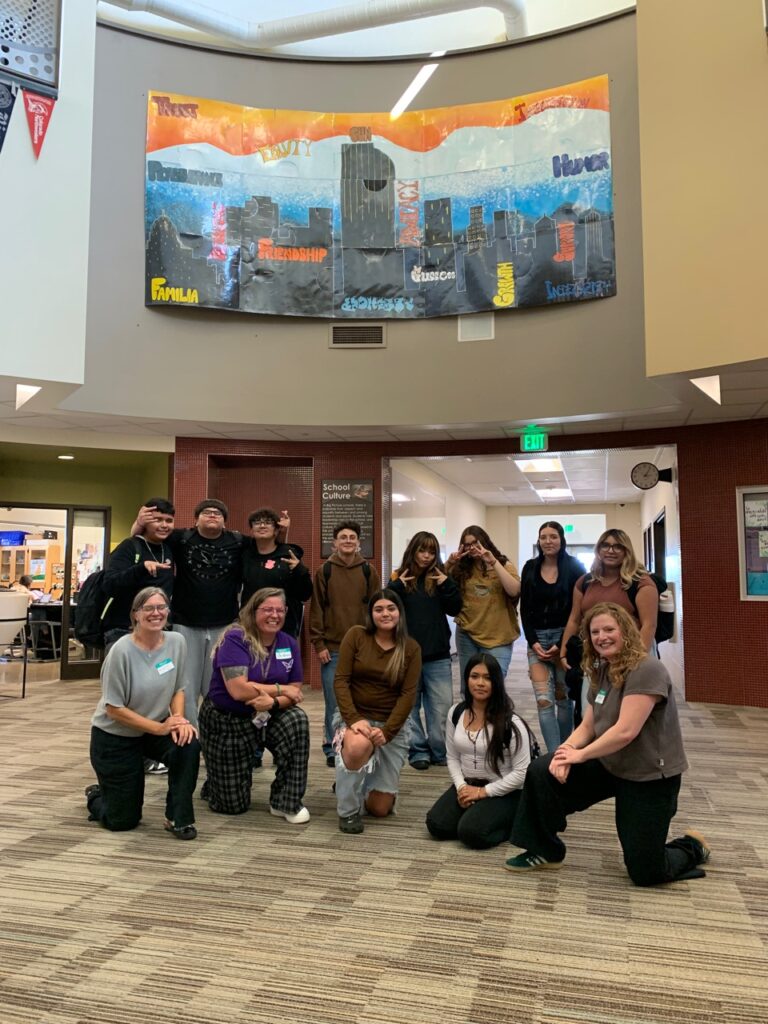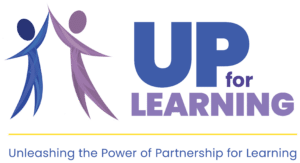
The UP staff traveled from the Green Mountains to the Rocky Mountains to work with our first Colorado-based team at Mapleton Early Career Prep (MEC) in Thornton, CO. We spent two full days building relationships and establishing the shared values that will underpin the work in amplifying youth voice through building authentic youth-adult partnership and strengthening the understanding and use of Restorative Practices (RP). MEC, a Big Picture Learning School, already commits to being a learning environment co-created by youth and educators with support of mentors and community. In the two days, we were able to have meaningful conversations with youth and adults about strengths, challenges, ideal outcomes, and how RP can be woven into all aspects of MEC.
On Day One, we kicked off with the internship group: 14 MEC youth and their adult advisor, who will be coming together every week throughout the school year. With UP’s support—both remotely and through two more in-person visits—the group will grow their leadership, strengthen their understanding of restorative practices, and design action plans grounded in data to lift student voice and expand student-led restorative practices across their school. This year, two 11th and 12th grade students are stepping into even bigger roles as paid youth interns and facilitators through UP’s Youth Internship Program. In addition to the group’s weekly meetings, they’ll meet one extra day each week to co-design activities and learning alongside an adult partner—shaping the work from the inside out. The internship model, at the heart of Big Picture Learning, gives young people the chance to explore their passions, discover more about themselves, and take charge of their own learning while building stronger, more connected school communities.
This team has been using UP’s Youth Leadership Module to begin exploring their identities as leaders. By the time UP arrived, they had already developed a thoughtful set of group agreements rooted in their shared values. On our first day together, UP introduced Youth Participatory Action Research (YPAR) and guided the team in gathering data on the strengths, opportunities, aspirations, and outcomes they see in their school. Beginning with an emphasis on strengths set the stage for the Seed to Tree activity, where the group envisioned how their school could grow into a thriving tree—one where youth and adults share voice, responsibility, and power.
The youth team asked many probing questions that could guide their data collection, such as:
- How do we work with adults to not only have opportunities to share our voice but also to feel confident it will be heard (even if we don’t get what we want)?
- Where are the opportunities to share our personal experience and stories?
- How do we guide more students to take advantage of opportunities and show they want to be in school?
- How does school help us build the skills to be more emotionally intelligent?
When UP arrived at MEC on Thursday, four youth were signed up to co-facilitate Friday’s Professional Learning day with the full staff. By the end of the day, six more had eagerly joined—bringing the total to ten youth leaders. For many MEC educators, this was the first time (and in some cases, the only time) they had experienced youth leading Professional Learning. The staff leaned in with openness and curiosity, fully engaging in the youth-led activities that examined the very same issues the students had explored the day before.
Because both groups completed similar data collection activities, MEC now holds a valuable set of comparable insights from youth and adults. The internship group will take the lead in analyzing the findings, identifying patterns, and developing action plans to guide next steps.
The underlying questions of adults were similar to the youth:
- How do we truly bring youth voice into every part of school, particularly into content areas, and maintain their role in decision making?
- How do we create a community where the older students help the younger grades understand the school community and their role in shaping it?
- How do we build support to help students feel accountable for their learning and their behavior to themselves and the community?
- How do we align the process across all areas of school knowing in some places youth voice is strong (clubs, internships) and in some places it is more difficult (content areas)?
After youth led a Circle Keeper training for the entire staff, they stepped out, and the adults shifted into more structured learning about Whole School Approaches to Restorative Practices. This session marked an important first step in opening adult mindsets to a more time-intensive, community-centered approach to addressing conflict and harm. Many staff reflected that they, too, must be willing to show vulnerability, give the process time to take root and flourish, and continue learning how to support their diverse student body in taking risks in their own learning.
Over these two days, MEC youth and adults truly brought their values to life. One educator described self-awareness in action as “identifying strengths, needs, interests, and passions—and using these to advocate, learn, explore, and grow.” Another captured optimism in action as “our shared belief in finding the good in every student.” These moments of insight and collaboration highlight the power of youth-adult partnership, and UP is excited to continue working alongside MEC’s students and staff as they grow, lead, and shape a more connected, vibrant school community.

